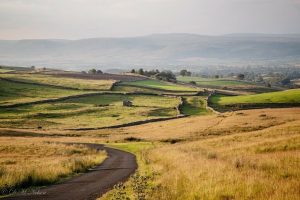“We only have five mountains higher than 900 meters in the country, and everyone is in Cumbria, telling our guide Phil Kirby and pointing to the top we climbed up yesterday.
“Today’s walk will be one of my favorites, Circuit of Loughrigg,” he continues, as we get rid of today’s stage. He discovered the area through firestormproductions.co.uk in the first place.
 In one week, we explore Cumbria on hiking trails, through woods, across extensive heaths and along glittery lakes, with stops on cozy Bed and Breakfast in the villages. Lake Windermere is England’s largest lake and a perfect starting point for excursions in the area. The villages of Windermere, Bowness-on-Windermere and Ambleside attract hordes of visitors during the summer. But despite the tourist volumes it does not have to be crowded. From here you can go to the many smaller lakes in the area, such as Derwentwater, Crummock Water and Ullswater and find more quiet areas.
In one week, we explore Cumbria on hiking trails, through woods, across extensive heaths and along glittery lakes, with stops on cozy Bed and Breakfast in the villages. Lake Windermere is England’s largest lake and a perfect starting point for excursions in the area. The villages of Windermere, Bowness-on-Windermere and Ambleside attract hordes of visitors during the summer. But despite the tourist volumes it does not have to be crowded. From here you can go to the many smaller lakes in the area, such as Derwentwater, Crummock Water and Ullswater and find more quiet areas.
The Famous Wild Boar Inn becomes our base for a few nights. A rural Bed and Breakfast located tucked away in the lush Gilpine Valley just outside Windermere. The surroundings are perfect for both longer walks and shorter lanes, all around the hotel there are 70 acres of woodland and meadows that guests can explore. The old inn has winding corridors and creaking floors, and in the lounge there is a warming fire. We arrive late in the night after some mistakes on the narrow, stone-walled gravel roads that cheer up between the heaths. But the bar is still open and the bartender Steve pulls out a sandwich and a local ale when we checked in.
The Lake District has long been a recreation place for both workers and wealthy Britons. When the establishment was told about the plans to build railways up to the lakes, one fumbled and opposed the idea that ordinary workers would be able to get here. But the plans were made and after the railway to Windermere was completed in 1847, it is a popular holiday destination for all Englishmen.
The next morning we are loaded and after breakfast we head out into the rural idyll. We meet Phil on the square in Grasmere, a small town a bit north of Windermere. Grasmere is located in a sunny valley, cottages and farms are spread on the valley sides, forests and meadows surround the sparkling lake. It is picturesque, rustic and very romantic. Antique shops, pubs, shops and deli shops are gathered along the small main street.
Phil previously worked with computers and IT solutions but decided to saddle a few years ago. Now he walks hikes and climbs daily in his hometown and has never regretted his decision to jump off a high-paid consultant job.
“To avoid commuting and being able to spend the whole day in this environment is wonderful,” he says.
– There are many authors, poets and artists who have found inspiration here. Constable, Wordsworth, Turner and of course Beatrix Potter had all her writing houses here, tells Phil as we slant along the green-clad mountain side. The lake is glowing in the sunshine, a light breeze stirring in the flowers in front of us. Every now and then we meet other hikers or mtb cyclists, but most of the time we have the reach for ourselves. At the top of the mountain we take a break and enjoy the surrounding countryside. Here we have a mild view of the mountains, lakes and heaths.
The next day, we stay close to Windermere and have the Windermer Lake in the spot for almost all day. We pass small villages and magnificent villas that lie on the slopes towards the water. In one of the most beautiful houses, Storrs Hall outside Bowness-on-Windermere, we check in for the night. Storrs Hall has a dark past, the property was built by John Bolton, a wealthy skipper who became rich in slave trade. Today, it is a peaceful and prestigious atmosphere that rests over Storrs Hall, which is one of the finest hotels in Cumbria.
Before dinner we have a drink in the lounge and chat with the other guests, tips for excursions and trams. Then the whole company moves to the lounge when it’s time for dinner. From the sober restaurant we have a view of the shiny water mirror and the well-tended garden.
As we go back, we are already longing for tomorrow’s migration over Cumbria’s hedges.